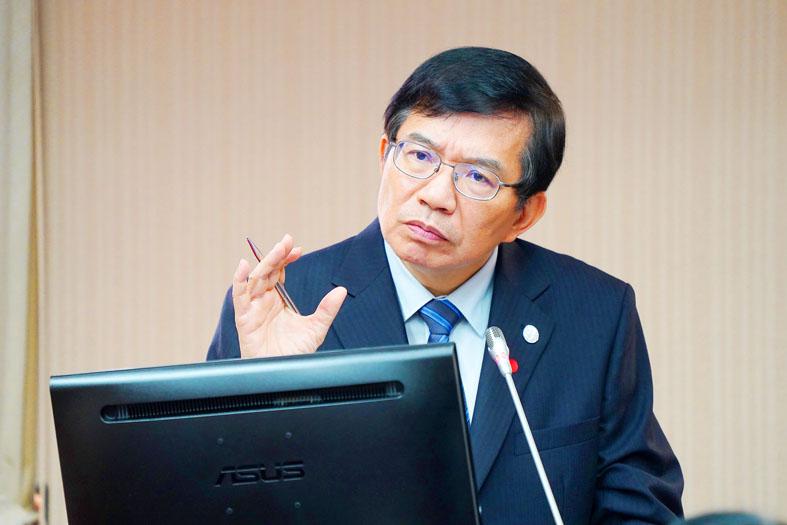The ultimate goal of reforming the Taiwan Railways Administration (TRA) is to turn the government agency into a state-run corporation, Minister of Transportation and Communication Wang Kwo-tsai (王國材) said yesterday.
Wang made the remarks at a meeting of the legislature’s Transportation Committee in Taipei, where he and new TRA Director-General Du Wei (杜微) briefed lawmakers about the details of reforming the nation’s oldest and largest railway agency, after a Taroko Express train derailed in Hualien on April 2, killing 49 people and injuring more than 200.
Democratic Progressive Party (DPP) legislators Chen Ming-wen (陳明文) and Lin Chun-hsien (林俊憲) asked Wang to elaborate on his pledge of “managing the railway agency like a corporation in three years.”

Photo: CNA
“That means turning the agency into a state-run corporation,” Wang told Chen.
Chunghwa Post, which was previously the Directorate-General of Posts, serves as the best example of how a government agency can be successfully transformed into a state-run corporation, Wang said.
Wang also told Taiwan People’s Party Legislator Andy Chiu (邱臣遠) about the specific goals he aims to achieve in the next three years.
“During the first year, I will focus on enhancing the safety of the TRA system and address its financial losses,” he said.
Wang said that his main task in the second year would be to communicate with TRA employees about turning the agency into a state-run corporation and stipulating an organization act legalizing such an establishment, adding that employees would not only see their salaries rise, but also gain more benefits after a corporation is established.
A state-run railway corporation would be officially established in the third year, he said.
In addition to Chunghwa Post, the Ministry of Transportation and Communications has also established Taiwan International Port Corp (TIPC) and Taoyuan International Airport Corp (TIAC) to manage the nation’s commercial seaports and largest international airport.
Union members at the postal firm, TIPC and TIAC received an increase in salaries after becoming state-run company employees, Wang said.
“Members of the Taiwan Railway Labor Union were against the proposal of turning the TRA into a corporation because they thought it meant privatization. However, privatizing a railway agency is difficult, as it is a monopolistic service,” he said.
While Chunghwa Post employees receive an average year-end bonus equal to 4.4 months’ salary, TRA employees’ average bonus equals about 1.5 months’ salary, because it is a government agency, Wang said.
Once the agency becomes a state-run corporation, the railway service would be managed by a board of directors, who would have more flexibility and efficiency in deciding the direction the state-run company would take, he added.
Meanwhile, the railway agency has identified 33 problems at 204 construction sites for temporary track projects after a comprehensive inspection, Wang said, adding that it had temporarily suspended the projects for the inspection.
Most of the problems were related to improper parking of construction vehicles, he said.
The most serious problem concerned the stability of side slopes, which must be addressed by building retaining walls or applying slope coverage measures, he said.
As of yesterday, 27 problems had been addressed, Wang added.
“As the nation is entering the wet season next month, I have asked the Railway Bureau to double-check to see if problems are being addressed,” he said, adding that the bureau must finish the task by May 15.

Alain Robert, known as the "French Spider-Man," praised Alex Honnold as exceptionally well-prepared after the US climber completed a free solo ascent of Taipei 101 yesterday. Robert said Honnold's ascent of the 508m-tall skyscraper in just more than one-and-a-half hours without using safety ropes or equipment was a remarkable achievement. "This is my life," he said in an interview conducted in French, adding that he liked the feeling of being "on the edge of danger." The 63-year-old Frenchman climbed Taipei 101 using ropes in December 2004, taking about four hours to reach the top. On a one-to-10 scale of difficulty, Robert said Taipei 101

Nipah virus infection is to be officially listed as a category 5 notifiable infectious disease in Taiwan in March, while clinical treatment guidelines are being formulated, the Centers for Disease Control (CDC) said yesterday. With Nipah infections being reported in other countries and considering its relatively high fatality rate, the centers on Jan. 16 announced that it would be listed as a notifiable infectious disease to bolster the nation’s systematic early warning system and increase public awareness, the CDC said. Bangladesh reported four fatal cases last year in separate districts, with three linked to raw date palm sap consumption, CDC Epidemic Intelligence

Two Taiwanese prosecutors were questioned by Chinese security personnel at their hotel during a trip to China’s Henan Province this month, the Mainland Affairs Council (MAC) said yesterday. The officers had personal information on the prosecutors, including “when they were assigned to their posts, their work locations and job titles,” MAC Deputy Minister and spokesman Liang Wen-chieh (梁文傑) said. On top of asking about their agencies and positions, the officers also questioned the prosecutors about the Cross-Strait Joint Crime-Fighting and Judicial Mutual Assistance Agreement, a pact that serves as the framework for Taiwan-China cooperation on combating crime and providing judicial assistance, Liang

US climber Alex Honnold left Taiwan this morning a day after completing a free-solo ascent of Taipei 101, a feat that drew cheers from onlookers and gained widespread international attention. Honnold yesterday scaled the 101-story skyscraper without a rope or safety harness. The climb — the highest urban free-solo ascent ever attempted — took just more than 90 minutes and was streamed live on Netflix. It was covered by major international news outlets including CNN, the New York Times, the Guardian and the Wall Street Journal. As Honnold prepared to leave Taiwan today, he attracted a crowd when he and his wife, Sanni,